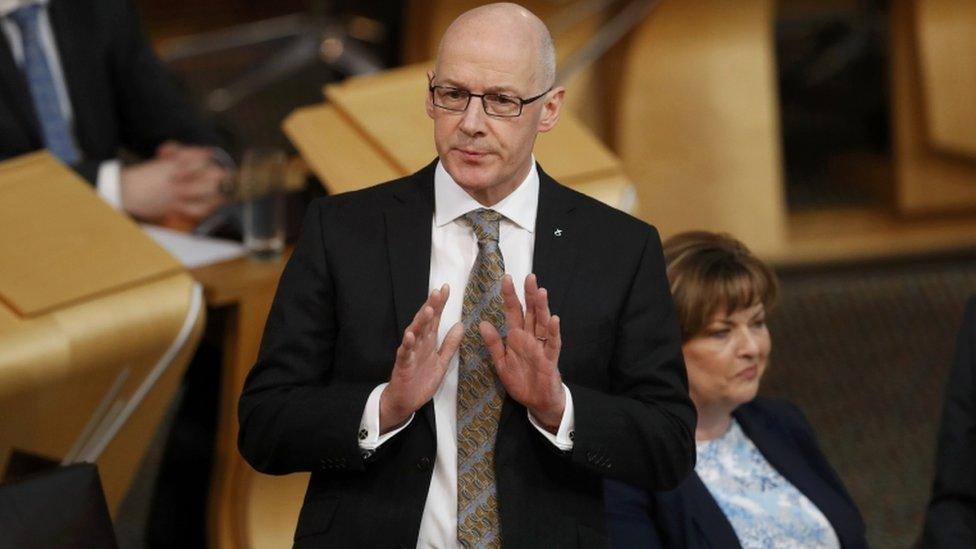Changes to named person law published
- Published

The named person will generally be a teacher or health visitor, depending on the child's age
The Scottish government has published changes to its controversial named person scheme.
The scheme will appoint a named person, usually a teacher or health visitor, who will be responsible for ensuring the welfare of every child.
It had been due to come into force last August, but the Supreme Court ruled that sections covering information sharing did not comply with the law.
The changes published on Tuesday, external aim to overcome those concerns.
They will ensure that public bodies can only share information about children if is likely to "promote, support or safeguard the wellbeing" of the child.
Public bodies will also be required to consider whether sharing the information would be compatible with data protection, human rights and confidentiality laws.
Only then will they be given the power to share the information.
Deputy First Minister John Swinney said the changes would bring "consistency, clarity and coherence to the practice of sharing information about children and young people's wellbeing across Scotland".
He added: "The Supreme Court ruled definitively that the intention of providing a named person for every child to promote and safeguard their wellbeing was 'unquestionably legitimate and benign'.
"But young people and families must have confidence that information will be shared only where their rights can be respected.
"We must ensure that we get it right for every child, but in a way that respects the rights of families fully."

Mr Swinney hopes to get named person up-and-running across the country next year
Supreme Court judges ruled in July last year that specific proposals in the Children and Young People (Scotland) Act about information-sharing were incompatible with the rights to privacy and a family life under the European Convention on Human Rights.
They said the legislation made it "perfectly possible" that confidential information about a young person could be disclosed to a "wide range of public authorities without either the child or young person or her parents being aware".
Judges at the Court of Session had previously ruled that named persons would have "no effect whatsoever on the legal, moral or social relationships within the family".
They added: "The assertion to the contrary, without any supporting basis, has the appearance of hyperbole."
The appeal was brought to the Supreme Court by the No to Named Persons (NO2NP) coalition, which includes the Christian Institute, Care (Christian Action Research and Education), Tyme Trust and the Family Education Trust.
They had claimed named person would undermine parents by appointing a state guardian for their children, and would stretch resources for protecting vulnerable children by creating a scheme that applied to all children regardless of need.
'Appearance of hyperbole'
The Scottish government said after the Supreme Court ruling that it remained absolutely committed to introducing named person, and would bring forward fresh legislation that would comply with the law.
It had originally hoped to do so in time for the scheme to be implemented by August this year - but that has been delayed until 2018.
The Scottish Conservatives, who have been vocal critics of the scheme, said the changes to named person marked a "major U-turn" by the government.
The party said the changes meant that "parents who do not accept the advice of named persons will not be subsequently viewed with suspicion by authorities".
But while welcoming the clarification on data sharing, the Tories said they continued to have "serious concerns" about the legislation.
'Time and money'
Simon Calvert of NO2NP said the new rules on information sharing were a "100% climb-down on their original plan of a statutory duty to share information about people's private lives almost without restriction".
Mr Calvert added: "If they'd only listened at the start, they could have saved huge amounts of time and money. They now have to retrain those who have already been trained to implement an unlawful scheme."
Scottish Labour said the implementation of named person had been a "complete mess from the start" and called on the Scottish government to produce a "clear plan to rebuild trust in the scheme".
The Liberal Democrats warned there was a "very real risk that the limited changes now being proposed won't be enough to regain the confidence of families across Scotland."
But the Scottish Greens welcomed the Scottish government changes, which it said meant that "We are now back on track to ensuring children in Scotland are as safe and well supported as possible".
- Published7 March 2017

- Published28 July 2016
